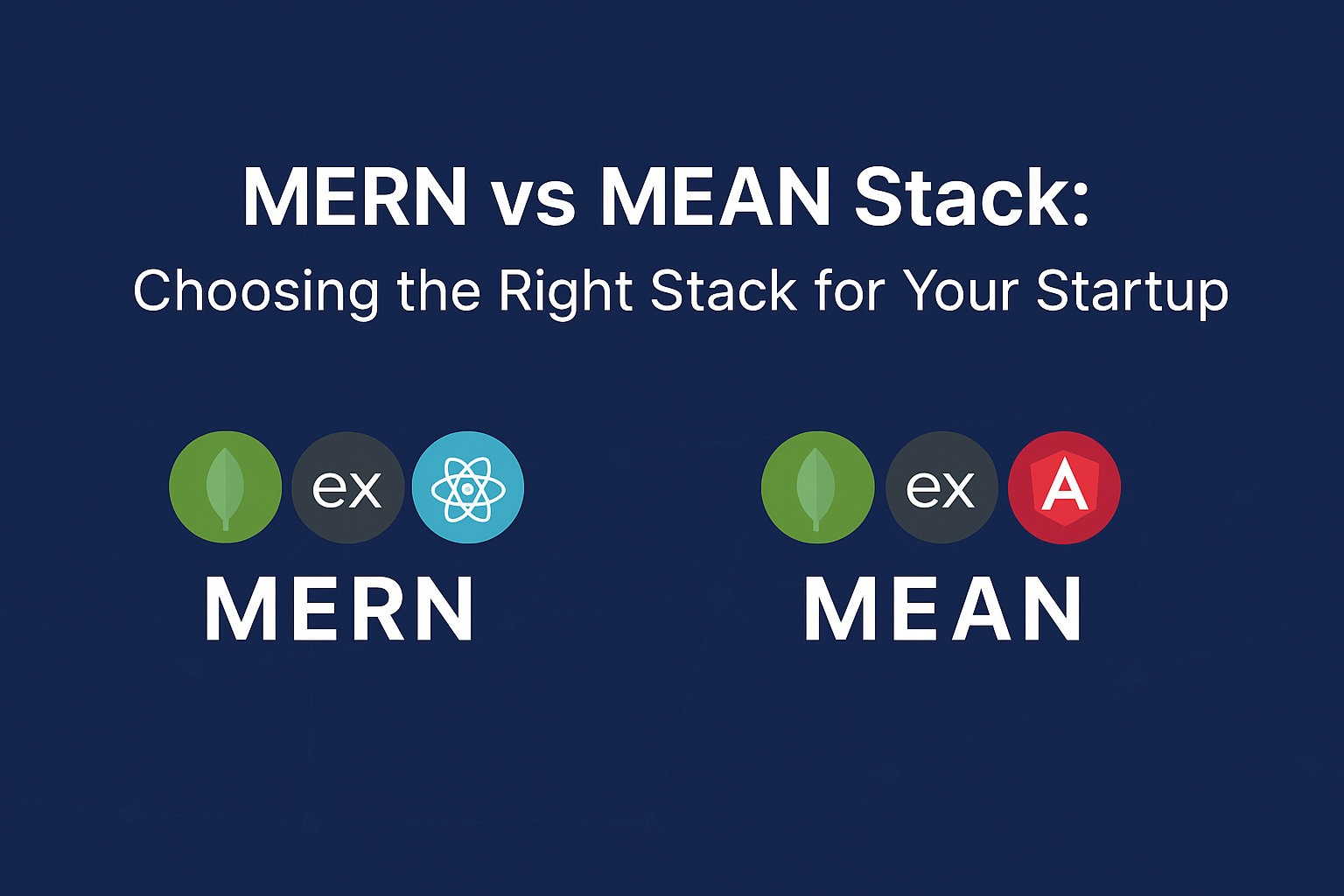When launching a tech startup, one of the first big decisions you’ll make is selecting the right technology stack. Your stack defines how your product is built, how fast it can scale, and how easily it can adapt to change. Among startups and enterprises alike, two JavaScript-based stacks dominate the web development scene — MERN and MEAN.
Both are powerful full-stack development frameworks built on JavaScript, offering an efficient way to build scalable, high-performing web applications. But which one should your startup choose? Let’s explore the differences, advantages, and ideal use cases to help you make a smart, future-ready choice.
Understanding the Basics: What Are MERN and MEAN Stacks?
Both MERN and MEAN are acronyms for a combination of technologies that handle everything from the database to the user interface.
- MERN Stack:
- MongoDB – NoSQL database for flexible data storage
- Express.js – Backend framework for Node.js
- React.js – Frontend library for building interactive UIs
- Node.js – JavaScript runtime for server-side development
- MEAN Stack:
- MongoDB – NoSQL database
- Express.js – Backend framework
- Angular – Frontend framework developed by Google
- Node.js – Server-side runtime
Both stacks share three components — MongoDB, Express, and Node.js — with the only difference being React (MERN) versus Angular (MEAN) on the front end. This single difference, however, can have a major impact on development speed, performance, and scalability.

The Power of a JavaScript-Driven Stack
A huge advantage of both MERN and MEAN is that they are entirely JavaScript-based, from front-end to back-end. This means:
- Faster development time
- Easier code sharing between server and client
- Reduced hiring costs since developers can work across the stack
- Streamlined performance and maintenance
For startups, that translates into faster MVP development, lower costs, and a quicker time to market — three essentials for any growing tech business.
MERN Stack: Flexibility and Speed for Modern Startups
React.js, the centerpiece of the MERN stack, offers unmatched flexibility for building dynamic and interactive user interfaces. Startups that prioritize speed, UX, and scalability often prefer MERN because React is component-based, lightweight, and easy to integrate with APIs.
Advantages of MERN Stack:
- Faster Development:
React’s virtual DOM and reusable components allow developers to quickly update UI elements without reloading entire pages. - SEO-Friendly Architecture:
With frameworks like Next.js, MERN can support server-side rendering, giving startups an edge in SEO and page performance. - Flexible Frontend:
React doesn’t enforce a strict structure, which is ideal for startups that experiment and pivot often. - Rich Ecosystem:
React has one of the largest communities in the world, offering countless plugins, UI libraries, and tutorials.
Ideal For:
Startups building consumer-facing web apps, eCommerce platforms, dashboards, or interactive SaaS products that rely heavily on user experience and front-end innovation.
MEAN Stack: Stability and Structure for Scalable Growth
Angular, the front-end framework in the MEAN stack, brings strong architectural patterns and enterprise-grade stability. It’s best for startups that plan for long-term growth and prefer a structured, opinionated framework.
Advantages of MEAN Stack:
- Robust Framework:
Angular includes built-in tools for routing, form validation, and dependency injection, reducing the need for third-party libraries. - Two-Way Data Binding:
Automatic synchronization between model and view simplifies updates and state management. - Enhanced Security:
MEAN’s strict architecture helps prevent vulnerabilities and enforces best coding practices. - Enterprise-Ready:
Ideal for large applications with complex workflows and multiple development teams.
Ideal For:
Startups building enterprise solutions, management systems, CRM applications, or large-scale SaaS products that need stability and predictable performance.

MERN vs MEAN: Head-to-Head Comparison
| Feature | MERN Stack | MEAN Stack |
|---|---|---|
| Frontend Framework | React.js | Angular |
| Development Speed | Faster for small to mid projects | Slower initially, better for large projects |
| Learning Curve | Easier to learn | Steeper learning curve |
| Performance | High due to virtual DOM | Strong but slightly heavier |
| SEO Optimization | Excellent with Next.js | Good with Angular Universal |
| Scalability | Very flexible | Highly structured and scalable |
| Community Support | Larger global community | Strong enterprise backing |
Which Stack Should Your Startup Choose?
Choosing between MERN and MEAN depends on your business goals, team expertise, and long-term strategy.
- Choose MERN if:
- You want a fast, flexible stack for MVP development
- Your app needs real-time updates or interactive UI
- You value customization over strict frameworks
- Choose MEAN if:
- You’re planning a complex, multi-module application
- Your team prefers a standardized, organized codebase
- You want long-term stability and enterprise-level security
At TechGroomers, we often recommend MERN for startups that need to launch quickly, test markets, and scale on-demand — while MEAN suits businesses seeking predictability and enterprise structure.
The DevOps & Performance Angle
Your tech stack is only as good as your deployment strategy. Whether you choose MERN or MEAN, DevOps integration plays a key role in ensuring continuous delivery, scalability, and uptime.
- Containerization (Docker/Kubernetes): Enables consistent deployment environments
- CI/CD Pipelines: Automates testing and deployment for faster iterations
- Cloud Scalability: Hosting solutions like AWS, Google Cloud, or Azure support both stacks efficiently
- Monitoring Tools: Combine stacks with tools like Grafana or Prometheus for performance tracking
TechGroomers helps startups design development workflows that merge DevOps best practices with modern JavaScript stacks — resulting in reliable, fast, and cost-effective web solutions.
Conclusion: Build Smart, Scale Fast
Both MERN and MEAN stacks are excellent choices for startups entering the digital landscape.
If your priority is speed, flexibility, and dynamic user experience, MERN is your go-to. If your focus is structure, consistency, and scalability, MEAN provides a strong foundation.
At the end of the day, your success depends not just on your stack, but on the expertise of your development team and the strategies you adopt to scale.When launching a tech startup, one of the first big decisions you’ll make is selecting the right technology stack. Your stack defines how your product is built, how fast it can scale, and how easily it can adapt to change. Among startups and enterprises alike, two JavaScript-based stacks dominate the web development scene — MERN and MEAN.
Both are powerful full-stack development frameworks built on JavaScript, offering an efficient way to build scalable, high-performing web applications. But which one should your startup choose? Let’s explore the differences, advantages, and ideal use cases to help you make a smart, future-ready choice.
Understanding the Basics: What Are MERN and MEAN Stacks?
Both MERN and MEAN are acronyms for a combination of technologies that handle everything from the database to the user interface.
- MERN Stack:
- MongoDB – NoSQL database for flexible data storage
- Express.js – Backend framework for Node.js
- React.js – Frontend library for building interactive UIs
- Node.js – JavaScript runtime for server-side development
- MEAN Stack:
- MongoDB – NoSQL database
- Express.js – Backend framework
- Angular – Frontend framework developed by Google
- Node.js – Server-side runtime
Both stacks share three components — MongoDB, Express, and Node.js — with the only difference being React (MERN) versus Angular (MEAN) on the front end. This single difference, however, can have a major impact on development speed, performance, and scalability.
The Power of a JavaScript-Driven Stack
A huge advantage of both MERN and MEAN is that they are entirely JavaScript-based, from front-end to back-end. This means:
- Faster development time
- Easier code sharing between server and client
- Reduced hiring costs since developers can work across the stack
- Streamlined performance and maintenance
For startups, that translates into faster MVP development, lower costs, and a quicker time to market — three essentials for any growing tech business.
MERN Stack: Flexibility and Speed for Modern Startups
React.js, the centerpiece of the MERN stack, offers unmatched flexibility for building dynamic and interactive user interfaces. Startups that prioritize speed, UX, and scalability often prefer MERN because React is component-based, lightweight, and easy to integrate with APIs.
Advantages of MERN Stack:
- Faster Development:
React’s virtual DOM and reusable components allow developers to quickly update UI elements without reloading entire pages. - SEO-Friendly Architecture:
With frameworks like Next.js, MERN can support server-side rendering, giving startups an edge in SEO and page performance. - Flexible Frontend:
React doesn’t enforce a strict structure, which is ideal for startups that experiment and pivot often. - Rich Ecosystem:
React has one of the largest communities in the world, offering countless plugins, UI libraries, and tutorials.
Ideal For:
Startups building consumer-facing web apps, eCommerce platforms, dashboards, or interactive SaaS products that rely heavily on user experience and front-end innovation.
MEAN Stack: Stability and Structure for Scalable Growth
Angular, the front-end framework in the MEAN stack, brings strong architectural patterns and enterprise-grade stability. It’s best for startups that plan for long-term growth and prefer a structured, opinionated framework.
Advantages of MEAN Stack:
- Robust Framework:
Angular includes built-in tools for routing, form validation, and dependency injection, reducing the need for third-party libraries. - Two-Way Data Binding:
Automatic synchronization between model and view simplifies updates and state management. - Enhanced Security:
MEAN’s strict architecture helps prevent vulnerabilities and enforces best coding practices. - Enterprise-Ready:
Ideal for large applications with complex workflows and multiple development teams.
Ideal For:
Startups building enterprise solutions, management systems, CRM applications, or large-scale SaaS products that need stability and predictable performance.
MERN vs MEAN: Head-to-Head Comparison
| Feature | MERN Stack | MEAN Stack |
|---|---|---|
| Frontend Framework | React.js | Angular |
| Development Speed | Faster for small to mid projects | Slower initially, better for large projects |
| Learning Curve | Easier to learn | Steeper learning curve |
| Performance | High due to virtual DOM | Strong but slightly heavier |
| SEO Optimization | Excellent with Next.js | Good with Angular Universal |
| Scalability | Very flexible | Highly structured and scalable |
| Community Support | Larger global community | Strong enterprise backing |
Which Stack Should Your Startup Choose?
Choosing between MERN and MEAN depends on your business goals, team expertise, and long-term strategy.
- Choose MERN if:
- You want a fast, flexible stack for MVP development
- Your app needs real-time updates or interactive UI
- You value customization over strict frameworks
- Choose MEAN if:
- You’re planning a complex, multi-module application
- Your team prefers a standardized, organized codebase
- You want long-term stability and enterprise-level security
At TechGroomers, we often recommend MERN for startups that need to launch quickly, test markets, and scale on-demand — while MEAN suits businesses seeking predictability and enterprise structure.
The DevOps & Performance Angle
Your tech stack is only as good as your deployment strategy. Whether you choose MERN or MEAN, DevOps integration plays a key role in ensuring continuous delivery, scalability, and uptime.
- Containerization (Docker/Kubernetes): Enables consistent deployment environments
- CI/CD Pipelines: Automates testing and deployment for faster iterations
- Cloud Scalability: Hosting solutions like AWS, Google Cloud, or Azure support both stacks efficiently
- Monitoring Tools: Combine stacks with tools like Grafana or Prometheus for performance tracking
TechGroomers helps startups design development workflows that merge DevOps best practices with modern JavaScript stacks — resulting in reliable, fast, and cost-effective web solutions.
Conclusion: Build Smart, Scale Fast
Both MERN and MEAN stacks are excellent choices for startups entering the digital landscape.
If your priority is speed, flexibility, and dynamic user experience, MERN is your go-to. If your focus is structure, consistency, and scalability, MEAN provides a strong foundation.
At the end of the day, your success depends not just on your stack, but on the expertise of your development team and the strategies you adopt to scale.




Leave a Reply